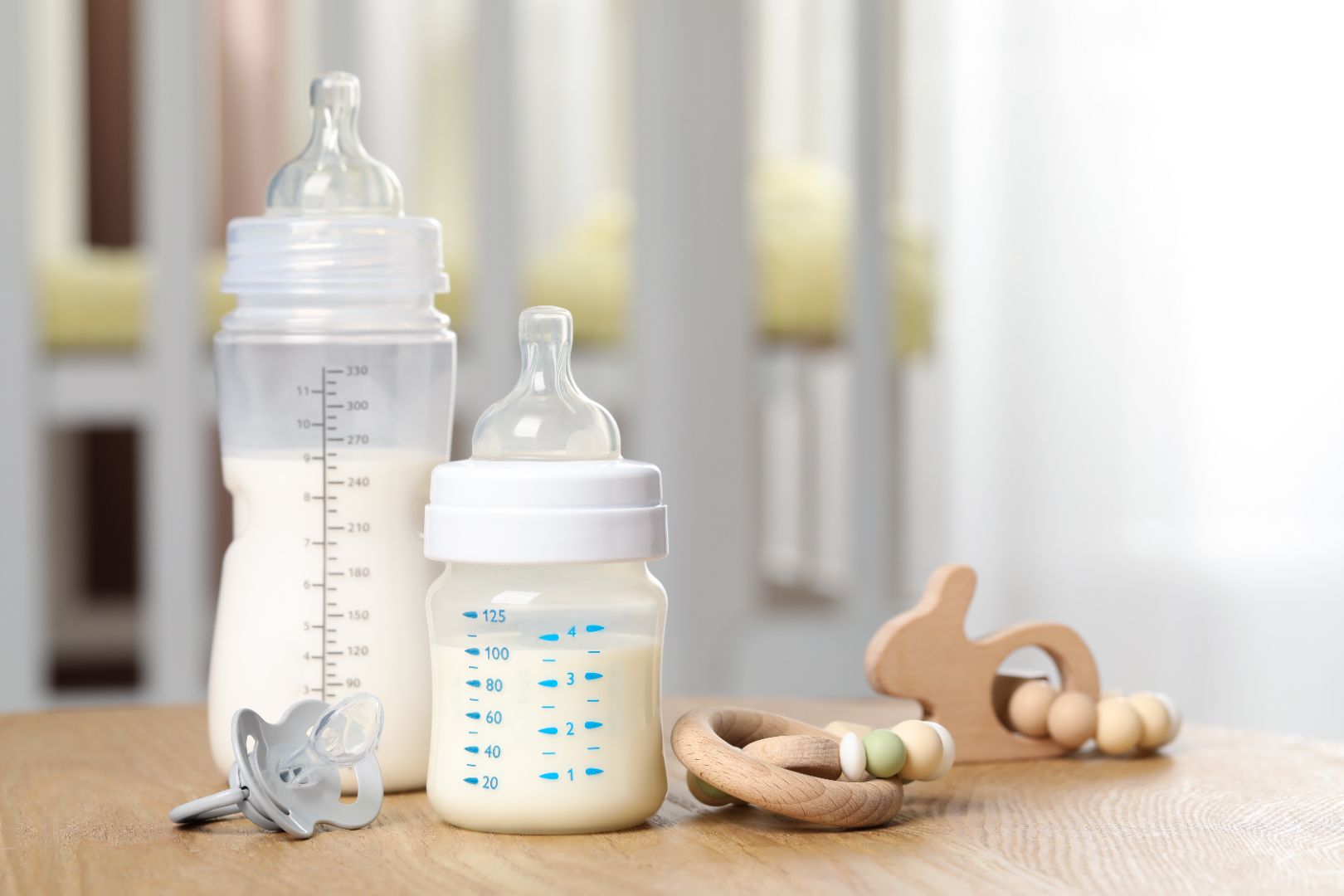Published July 11, 2024

Can You Mix Breast Milk And Formula?
New to infant feeding? You might be wondering if combining breast milk and formula is okay; it’s a natural concern when you want the best for your baby's health and happiness. And while you can combine the two, there are a few important considerations you'll want to keep in mind.
Read on to explore the essentials of combining breast milk and formula, including the benefits, aspects to take into account and situations where this approach is suitable for your baby’s feeding routine.
Understanding Breast Milk, Formula and Mixing the Two
Breast milk is a remarkable source of nutrition for infants, naturally tailored to meet their needs. Breastfeeding also fosters bonding and provides long-term health benefits for you and your baby alike. Because of this, the American Academy of Pediatrics and the World Health Organization recommend exclusive breastfeeding for the first six months of age and up to 2 years if mutually-desired — or using donor milk (via a milk bank) if your own isn't an option.
However, although studies show that 84.1% of U.S. families have at some point given breast milk to their infants, the Centers for Disease Control and Prevention (CDC) reports that most do not exclusively breastfeed or continue breastfeeding for the recommended duration.
That’s where infant formula comes into play, providing a convenient, safe, and healthy alternative to breast milk. Concerned about its nutritional value? Rest assured! Not only is it formulated based on breast milk's nutritional profile, the Food and Drug Administration mandates that it includes 30 essential nutrients for the health and well-being of your little one. There are even several types to consider, from cow’s milk-based and soy-based to organic and hypoallergenic options.
With this in mind, some parents choose to alternate feedings between nursing and formula bottles or between bottles with pumped milk and bottles with formula. You might consider combo feeding for several reasons, from insufficient breast milk supply and convenience to simply adjusting to your baby’s feeding or taste preferences.
Mixing Breast Milk and Prepared Formula and It’s Benefits
When combining breast milk and baby formula for combo feeding, there are several potential benefits you can enjoy, including:
Flexibility
Using prepared formula with breast milk allows you to adjust feeding routines based on your and your baby's needs — whether it's accommodating growth spurts, fitting in with your busy calendar or anything in between.
Dietary Support
Supplementing breast milk with baby formula can be a helpful way to ensure your little one meets their growing requirements for calories and nutrients. This combination is especially useful during times when breast milk alone may not suffice, such as if your baby needs extra nourishment to support rapid development.
Convenience
If you're returning to work or needing to share feeding responsibilities with other caregivers, exclusively breastfeeding might not be feasible or desired. That may mean that offering formula with breast milk might better accommodate your lifestyle without compromising your baby's nutritional needs.
Parental Relief
Combo feeding with both breastmilk and prepared formula can alleviate stress if you're facing hurdles like low milk supply or difficulties with breastfeeding. Knowing you have the option to supplement breast milk with formula can provide peace of mind, ensuring your little one's health and growth are supported even under challenging circumstances.
Other Factors To Keep in Mind
On the other hand, there are a few important factors to consider before starting with this approach. You might want to think about:
Potential Digestive Issues
A breastfed baby can experience potential digestive issues when adding formula to the mix. An increase or change in baby’s digestive symptoms can be expected during the first 7-10 days as baby transitions, and aren’t necessarily a sign of intolerance! Be sure to monitor your baby for any signs of discomfort, like gas or constipation, and consult with your pediatrician if any concerns arise–particularly after the transition period. Fortunately, gradually introducing combo feeding can help your baby's digestive system adjust more easily.
Allergies and Sensitivities
Babies can have allergies or sensitivities to certain ingredients in formula, such as cow's milk or soy. You'll want to pay attention to symptoms of allergic reactions, like rashes, vomiting, or diarrhea, or blood in the stool (even small specks)! These symptoms are naturally concerning to parents, so if you suspect an allergy or sensitivity, consult your healthcare provider to determine the best formula option for your baby.
Nutritional Balance
To ensure the right nutritional balance when combining prepared formula milk and human milk, it's important to follow guidelines on proper ratios. Always make formula according to the instructions on the label! Do not use expressed breastmilk to mix powdered formula— powdered formula must be constituted with water according to the directions on the package. This way, you can rest assured your little one is getting the necessary nutrients from both sources. Worried about getting it right? You can always speak with your pediatrician for guidance on the proper balance to support your baby's unique needs.
Preparation and Storage
Your baby's health is always of the utmost importance, but it's easy to overlook proper storage and preparation guidelines when mixing breast milk and formula. While both have different storage requirements, be sure to follow the storage recommendations for formula. This includes preparing the formula according to the instructions so it's safe and nutritious for your baby.
Ultimately, a combo feed with mixed formula can support your baby’s growth and development while giving you peace of mind and the flexibility to manage your busy life. However, if you’ve been thinking about this approach, make sure you weigh all of the potential factors and consult with your pediatrician to determine the best feeding plan for your little one's needs.
When Does It Make Sense To Mix Breast Milk and Formula?
Not sure whether you should combo feed baby formula and breast milk? There are several reasons you might consider starting this type of combo feeding:
Low Milk Supply
If you’re experiencing low milk supply or are concerned that your baby isn’t getting enough nourishment from breast milk alone, adding formula feed or mixed feeds to your routine can help ensure they receive adequate nutrition and stay satisfied. This allows you to continue breastfeeding while supplementing with formula as needed.
Special Dietary Needs
Some babies have specific medical needs that may require additional nutrients or calories not provided by breast milk alone. If this is the case, mixing prepared formula with breast milk (or fortifying breast milk with formula) can help you meet nutritional requirements. That way, you can be certain your baby has the necessary support for healthy growth and development. Please consult with your child’s healthcare provider for guidance in this case.
Personal Health and Feeding
Studies suggest that certain maternal health conditions or medications can impact the ability to breastfeed exclusively, like insufficient glandular tissue or some chemotherapy drugs. Combining breast milk with formula makes it easier to maintain your baby’s nutrition while also managing your personal health. This promotes your well-being while meeting your baby’s dietary needs.
Flexible Feeding Solutions
The life of a new parent is hectic — to say the least. Balancing family, work, and personal time can make exclusive breastfeeding a challenge. Combining breast milk with formula can provide more flexibility, making it easier to manage your daily responsibilities while maintaining a healthy feeding routine for your baby.
Practical Tips for Mixed Feeding Success
Starting out can be nerve-wracking, with so many guidelines to consider for getting this method right. But, rest assured there are a few practices you can follow for a potentially smoother transition to mixed feeding and a happy and healthy baby:
- Use the proper ratios: Make sure you're powdered formula with water in the correct proportions. If needed, consult with your healthcare provider to help determine the best ratio.
- Maintain hygiene: Sterilizing bottles and nipples before each use is important to prevent bacteria buildup and reduce the risk of infections. Plus, washing your hands thoroughly before handling bottles and preparing feeds helps maintain cleanliness.
- Keep temperature in mind: If your baby is used to nursing and associates milk with body temperature, it’s encouraged that breast milk and formula should be warmed to the same temperature before feeding. Using a bottle warmer or placing the bottle in warm water can help you get it to the right temperature. That being said, you want to avoid using a microwave, because it can create uneven heating and hot spots that could hurt your baby's mouth.
- Follow storage guidelines: Proper storage of breast milk and formula is essential to maintain their nutritional integrity and safety. While the CDC reports that breast milk can be stored in the refrigerator for up to four days or in the freezer for several months, prepared and unserved formula should be used within 24 hours if stored in the refrigerator. Labeling bottles with the date and time can help you keep track of freshness and discard any unused portions to prevent contamination.
Finding the Perfect Formula Fit for Your Baby
If you’re ready to get started on your mixed formula feeding journey, it’s important to find the ideal formula for your little one. Choosing the right option involves understanding their unique needs, considering potential sensitivities and exploring all of the available alternatives. Fortunately, there’s no shortage of resources and formulas to guide you through the mixed bottle-feeding process successfully.
Baby’s Only is a trusted provider of infant formula, dedicated to promoting the health and wellness of babies. We offer organic formulas meticulously designed to provide optimal nutrition for your baby’s development. By selecting Baby’s Only, you can rest assured knowing you’re offering your child high-quality, safe and nourishing options. Remember, the goal is to support your baby's growth and happiness — and with some research and consultation with your pediatrician, you’ll discover the right formula fit for your baby.
Searching for an organic alternative? Shop Baby’s Only formula today!
The content on this site is for informational purposes only and not intended to be a substitute for professional medical advice, diagnosis or treatment. Discuss any health or feeding concerns with your infant’s pediatrician. Never disregard professional medical advice or delay it based on the content on this page.


